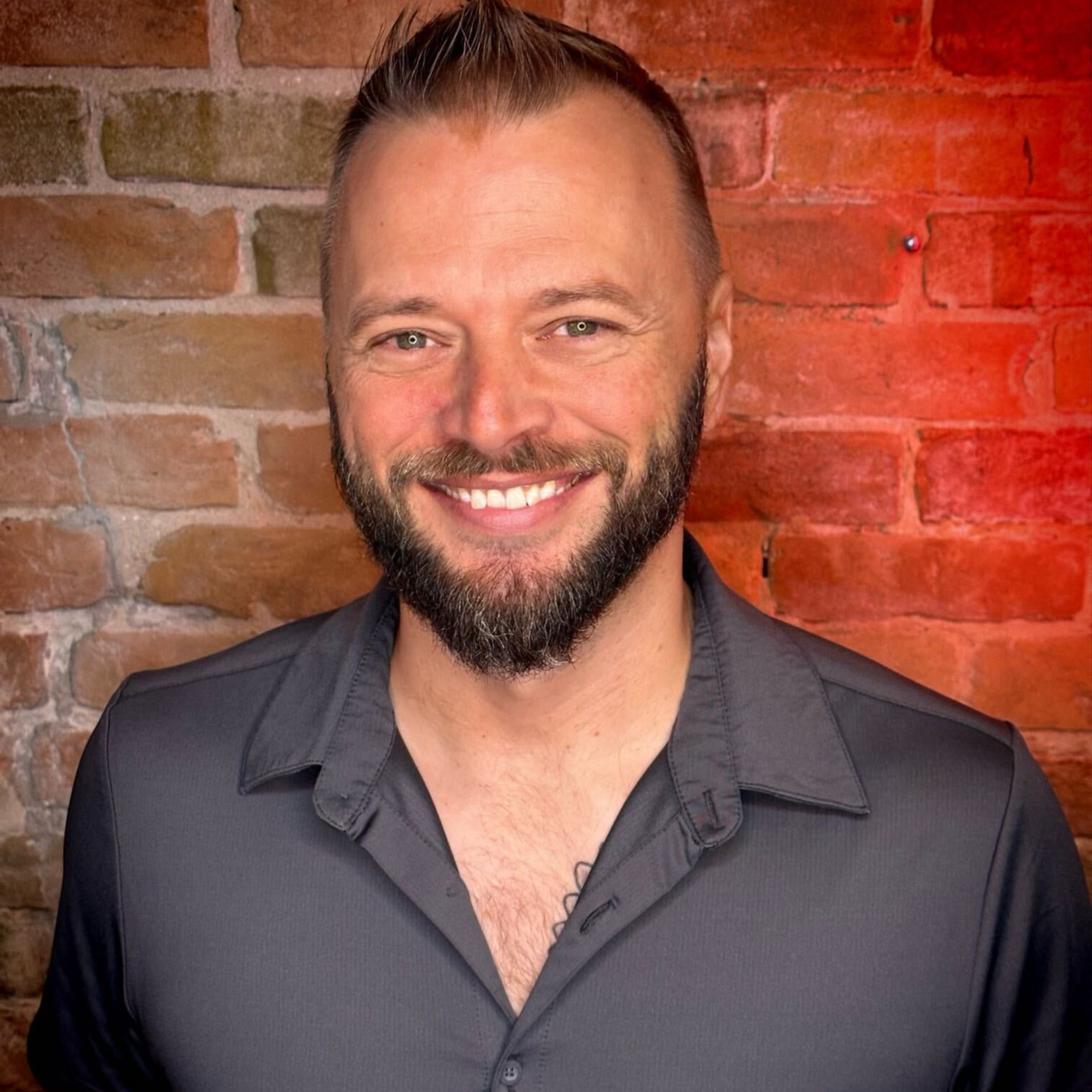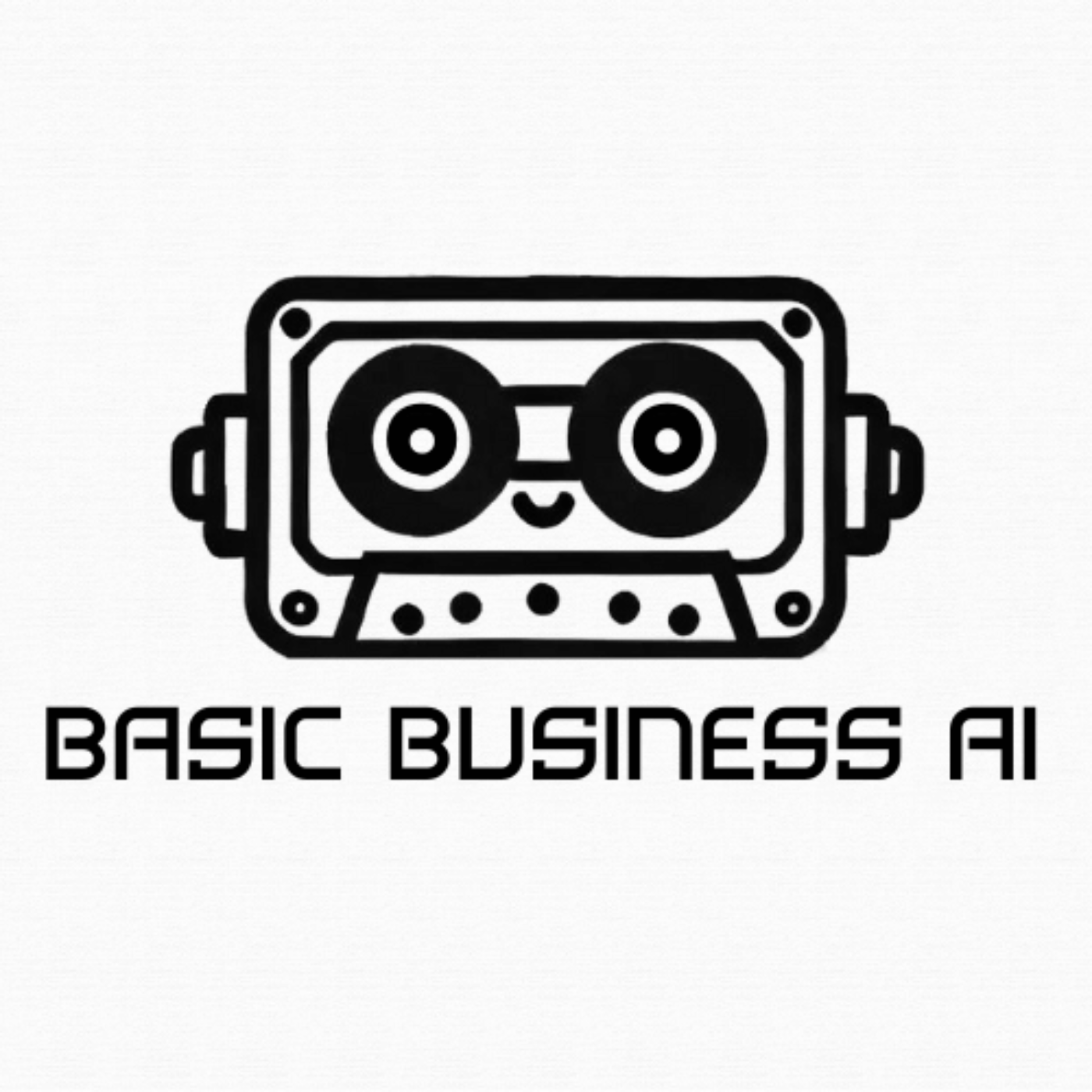[00:00:00] Speaker A: Welcome to Basic Business AI, a podcast dedicated to simple AI strategies for businesses who don't want to get an advanced tech degree or hire some marketing bro. I'm your host Ana Gonzalez and you can find me on social media at anabugprime. We bring on regular business owners like you and me to discuss practical strategies, ideas and perspectives about AI without getting too far into the weeds of the tech. BBAI is sponsored by Conversational Funnels the easiest way to get more sales is to get more chances to sell. We used one simple conversational funnel to casually book 121 qualified sales opportunities in less than two weeks. In a brand new market where we had zero presence and zero connections, all without spending on ads, doing call outreach or posting endlessly on social media.
This is the new way to close high ticket clients for 2025 and it only takes minutes to start booking calls. Download the blueprint for
[email protected] Today's guest is Andy Hilliard. As a CEO of Accelerance, Andy Hilliard is a leader and advocate for global collaboration, helping companies build high performing distributed software teams that extend their engineering capabilities and culture. With over 30 years in global software, ranging from his leadership at Cognizant to founding a nearshore development firm in Costa Rica, Andy now focuses on establishing. Enabling, sorry, enabling businesses to harness globally distributed development through a network of certified partners worldwide. So Andy, welcome to Basic Business AI from your perspective, how is AI reshaping the future of your industry?
[00:01:46] Speaker B: Well, yeah, it's turning the industry of global software outsourcing on its head. As we can all imagine, the evolution of global software outsourcing over the last 25 years has been meteoric.
I began this company in 2001. I also started a nearshore software development firm in 2003. And as Anna, you said, I was working with Cognizant before that. So software development, whether it's onshore or offshore, it ran the gamut from low level activities all the way through core development. And with the advent of AI and the evolution of AI now that we see in the last couple of years, it's challenging both clients and service providers to understand and evolve quickly with how AI is automating a lot of these lower level activities within the coding ecosystem. And, and then to make those changes work for one another in from the service provider side it's or even in house it's determining exactly you know, in, in a quickly evolutionary way, you know, what tasks AI can take over or copilot and start to assume and then which Tasks are still human based. That really requires human intervention, human control management and such. So it is a quickly evolving world that we live in.
[00:03:30] Speaker A: Awesome.
Yes. And some of them, like the creativity of the human being, cannot be AI, cannot do that. So what are some practical applications that you use in your business with AI?
[00:03:48] Speaker B: Well, let me give you a little bit of context. So you said in your introduction that my firm, Accelerants, has a network of software development partners around the world. So what we actually do is we assess like 10,000 software service providers around the world and we scorecard them based on their ability to provide software development services to US clients. And out of that 10,000 we maintain around 80 certified partners in 32 countries, Asia, Latin America, Eastern Europe. And these service providers are generally, and we like to say small enough to care, large enough scale. There are a couple of hundred engineers, but they, they tend to be really hyper focused around maybe a, a industry vertical or an application type or technology stack. Obviously they have their uniqueness in location and, and culture and, and relative size.
And all of these hyper specialized partners are highly aligned with primarily the US marketplace, the US culture, and as I said, hyper specialized around just a certain number of attributes and elements that are important to a particular customer. And all of these service providers have one thing in common. They have really strong practice management, process management, thought leadership and business leadership. They tend to be recruiting the very smartest engineers from the street and from the educational institutions, institutions.
But the problem is that they get lost in the sea of 30,000 software service providers that are largely selling smoke and mirrors and the promises of AI and automation. And it's all a house of cards. So who can you trust? Who is credible? Who is recruiting the best and training the best and retaining the best and providing the best services. Now to AI, obviously these companies, since they're so great but relatively unknown or lost in the milieu, they need to be implementing and embedding the latest and greatest, the best AI tools, practitioners and talent that are coming in to maintain this sort of level of excellence that these service providers maintain. Otherwise they too will be an afterthought. They will be a commoditized smoke and mirror shop that, you know, tries to trick someone into working with them and then delivers event essentially nothing and leaves everyone with a bad taste. So I guess to answer your question is like in the world, like in the world of anything that where there's a lot of supply and everything, there's even on Amazon you got the good products and then you got the rest of the Junk. And how, how do you separate the two? Who can you trust and what, what is proven and, and.
Yeah.
[00:06:51] Speaker A: That'S awesome. You know, it reminded me of. I, I read a book about one or two years ago, and I don't exactly remember the name. It's the, it's called the Long Tail and it talks about how, I mean, you go to the grocery store and you see the shelves and they have limited quantity of materials or, or items. But now with the Internet, the shelves are infinite.
[00:07:18] Speaker B: Exactly.
[00:07:19] Speaker A: So it's, it takes a lot more effort if, if there's an infinite shell for someone to, you know, we become like needle in a haystack.
[00:07:31] Speaker B: Yeah, yeah, it's true. And we're, we're all, we're all inundated with this plethora, this unlimited shelf of options. And humans think that through the use of the Internet and tools that we can do it ourselves. And that's, that's brought us a lot of power and control, but it's also brought us a lot of confusion and chaos and bad experiences based on people gaming the system. You know, if there's a system, if you think you have control with using a system, well, everyone else in the world knows that you're using the system and they are going to game the system in order to put you, you know, give you this false sense of security. And then you have to live through, you know, the, the learning experience, this, the scraped knee, as they say, and find out like, well, I have the power, but I don't have the knowledge. And I don't know, in this infinite choice, I, I re. Ultimately, I don't know who I can trust, who is credible and who I can trust. And it's funny that we're talking about credibility and trust because, you know, it's like, oh, it's about AI and automation and control and, you know, things that, you know, we don't need the credibility and trust what you do, because the development of solutions is a team sport. Regardless of what you can automate through tools and technology, which is a great thing in our lives, it still requires a, A, an aggregation, a galvanization of different people with different skill sets who are credible in what they do, experienced in what they do, and are trustworthy and accountable to deliver. And those are like really basic human traits. It's funny that we can take AI and, and boil it down into like, you know, you just want a good outcome. That's all you want. And you still need human beings to do that.
[00:09:27] Speaker A: Yes. And also for you to be able to have a good outcome. You need to know how to use the tool because that's what at the end, that's what AI is. It's a tool. So just like a hammer, if you don't know how to use a hammer, how are you going to put the nail in the, you know.
[00:09:44] Speaker B: Yeah. I live on Gen AI every single day. It's an idea generator.
I have conversations constantly, you know, 10 hours a day with Genai in trying to figure out a concept, my options, the pros and cons, and to sort of bring together sort of the, you know, key understanding and learning. And it gets me to a point that I could never get anywhere else in order to come together with other people who, who can then execute. You know, it helps me ideate, it helps me create. And by, by nature, by the way, I'm an ideator and a creator and there's only certain things you're really good at, and those are two things I'm good at. What I'm really not good at is, is necessarily galvanizing the experts. And what's the other term? Discerning the right option from. From the wrong option and executing. And now you may say, wow, those are a lot of things you're not good at. It's like, well, I'm okay at them, but I'm really good at the ideation and creation stage. And I use AI constantly to help me boil down my ideas into something that I can present to a group of people and then we can all come together and execute on it.
[00:11:08] Speaker A: I think that what you mentioned is very important because we all are great at 1, 2, maybe 3 things and we all also are really bad at 1, 2, 3, maybe other things. And we all need help from everybody. It's a team sport. Yeah, Life itself is a team team sport.
[00:11:25] Speaker B: Can I throw in a little plug for something? There's a book called the Six Types of of Working Genius. It's a Pat Lencioni book. He's really famous for the five Dysfunctions of a team and a lot of other sort of management books. And that, that's right to your point, Anna, is that there's six types of working genius and it spells out widget like to like wonder and invention, discernment and galvanization, execution and tenacity. It doesn't mean we can, we could all do all of those things along the continuum. But honestly, you're excellent in two of them. You're okay in two of them and you're relatively weak in two of them. And by weak it doesn't mean you can't do them. It means that you don't get your energy and your positivity out of doing those things. If you have to do it, you'll do it. But it's really better for someone who gets energy and happiness from doing those things, put them in charge of that. You focus on your energy and happiness in the things that bring you the energy and happiness.
[00:12:27] Speaker A: Yes. And that's how we bring like the full motivation to do the work and actually do it right in and happy.
And thank you so much for this. This has been awesome.
Also, I was going to say about that haystack in the middle and the whole universe of platforms, let's say, of AI, it's just so much that it gets overwhelming and confusing and we don't have to learn all of the AIs that are there or all of the platforms. We just need to find two, three that are working for us in our business and then be really good at them. And if we find that we want to do something else, let's bring someone else who knows how to do them better.
[00:13:11] Speaker B: What do you think we have, that's the point of this whole podcast right now is, is we have the ability to do many things, almost everything, because there are tools there that allow us to do everything. But in order to be as effective as you could be, to be as happy as you can be, to be as energized as you can be, you got to pick your lane and then you have to surround yourselves with experts. And that's, that's essentially what our business is, is, is, look, whatever your business is, it's not a, it's probably not a software development generation engine. You know that all they do, everyone is there to, to exercise processes and accountability and measurement and improvement around software engineering. Your business may be very software enabled or related, but it's not a factory. And so if, if you want to stick to what you're really good at, envisioning the future and attacking the marketplace and, and you know, doing your strengths, weaknesses, opportunities, threats sort of thing, and winning in the marketplace, and you're very technology enabled, you need to decide what to own and what not to own and who to do one thing and who to do that. And if you're going to say like, okay, I need a software partner that really gets me and fits with my culture, is embedded and integrated in my culture and there are specialists in my industry so that they can enable me to win and succeed and I could focus on the marketing and the sales and differentiation and they could focus on the technology.
Then, like, where do I find these people and those people that are actively embedding AI into their processes and are reliable and credible and trustworthy?
How can I find them? People? And there are platforms, but again, platforms are gamed in order to make them work for. And then there's, you know, you could come to Accelerants and you could say, like, yeah, we, we literally travel the world. I'm off to Asia in two weeks to visit various partners and we have teams traveling all over the world and come to someone who knows, who can help you fill that gap of not what you're good at, but what you really need in order to enable yourself.
[00:15:27] Speaker A: Well said. So, Andy, tell us about who you serve and how people can reach out to you.
[00:15:31] Speaker B: Well, people can reach out to
[email protected] and I'm based in Sonoma, but that really doesn't matter. I mean, Zoom is all the time here. And yeah, so accelerants.com is the website and I'm more than happy to share any knowledge and guidance that I can.
[00:15:54] Speaker A: Awesome. So we're going to wrap him here. Thanks to our guest, Andy Hilliard for joining us for a practical conversation about AI and its potential for business. You can learn more about what he does by visiting accelerance.com or emailing him at andycexelerance.com if you run a business of any size and you have some ideas or strategies around the topic of AI, we'd love to have you on a future episode as well. We interview business owners of all levels.
We interview business owners of all levels, especially the 90% of us who are curious about AI but not trying to be tech geniuses. Apply for our future episode by going to basicbusinessai.com and one more time, if you want to stuff your calendar with qualified and motivated ideal clients, want what you have? Download the Conversational Funnels blueprint for
[email protected] See you next time on Basic Business AI. Oh, and by the way, if you like this episode, tell your friends, see you later.



